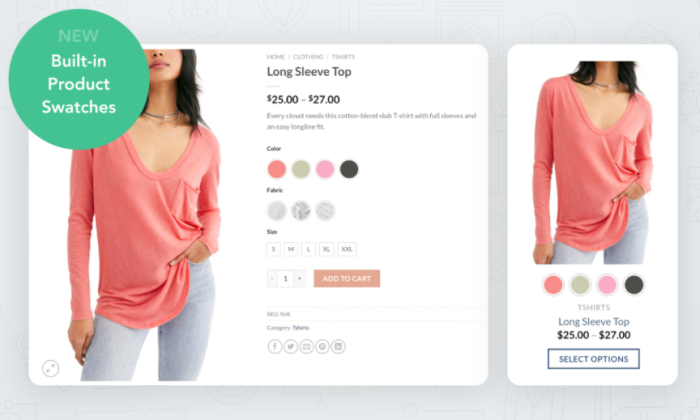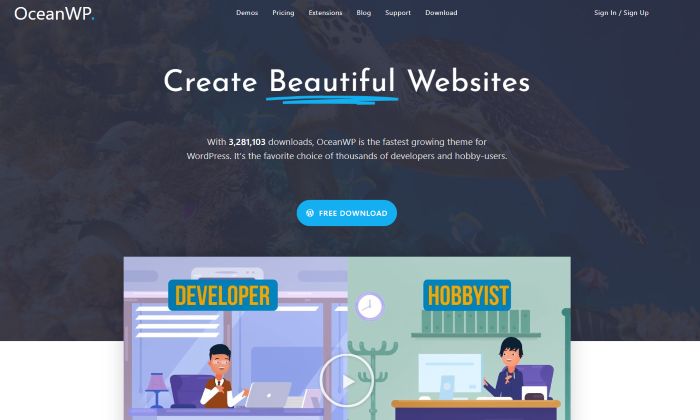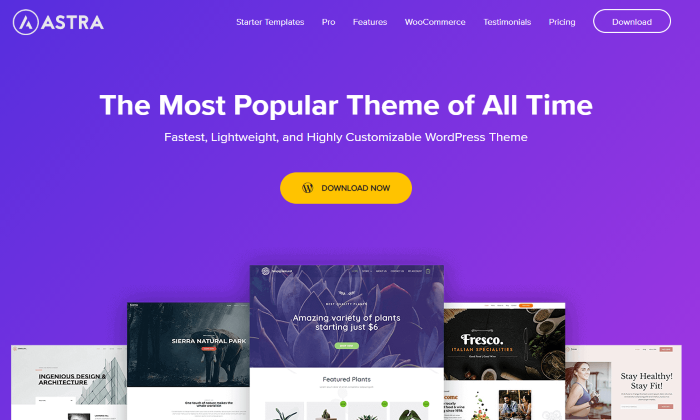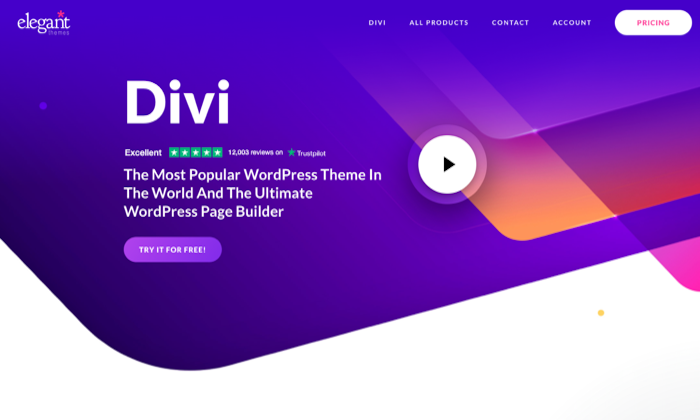
Disclosure: This content is reader-supported, which means if you click on some of our links that we may earn a commission.
Do you dream of having an online shop that attracts customers immediately? It sounds like it should be a lot of work, but it’s not.
Using the best WordPress ecommerce themes, you can quickly set up a website that makes it easy for customers to buy whatever you’re selling.
You want to find a theme that looks good and speaks to your brand. Something that organizes your store in a sensible way.
This guide will help you select an ecommerce WordPress theme that works to your shop’s advantage and offers everything you need to see more sales.
#1 — Flatsome Review — Best for Convenient Ecommerce Shop Maintenance

Flatsome’s design focuses on making ecommerce easier for people on both sides of the screen. That’s part of what makes it the most popular WordPress theme on ThemeForest.
Its versatility makes it easy to use and especially convenient when you need to make quick site changes, list new products, or even do a complete overhaul. Flatsome’s designs focus on being intuitive for users and do updates regularly to keep everything current.
If you use WooCommerce, it is nice to know that Flatsome is the number one best-selling WooCommerce theme with thousands of five-star reviews. Get started with one of the templates that speaks to the brand of your online store. You have a lot of options.

With over 300 layouts for customization, it has fewer design features than Divi and Astra. The good news is that if you don’t need a complex website, Flatsome does most of the work for you. Plus, its fast loading speeds and intuitive design make for an overall positive user experience.
Flatsome makes it easy to maintain your site, whether you do it yourself or have someone to handle it for you. They claim you need absolutely no coding experience to get the most out of their theme using their responsive Live Page Builder and an extensive library of building and customizable elements.
Flatsome doesn’t have a free version. For $59, you get all features with a regular license. Learn more.
#2 — Porto Review — Best for Niche Ecommerce Setups

Porto has an ecommerce-specific design with over 20 premade demos to help you build your site. It even divides its design variations into niches, making it easy for you to choose the right one for your business without sifting through a list of layouts.
Many of Porto’s designs look similar, so if you want something completely one-of-a-kind, it may not work for you. However, the designs it does have give any site a functional, clean look ready for any ecommerce industry.
You can tailor your site to what you sell, so your theme matches your brand. With customizable headers, product quick view, and product page customization, you have what you need to help your listings stand out.
Porto offers six different versions of product detail pages to give your customers exactly the right view of your products and also has an extensive library of documentation and responsive support to help you get your site up and running ASAP.
When it comes to conversions, Porto’s SEO-friendly setup helps you get noticed in searches. Plus, with a responsive, organized theme, customers will want to stay on your site. Porto is even Retina-ready, so you’ll have no problem displaying high-quality images.
You can get this theme from ThemeForest for $35 for a regular license.
#3 — Shopkeeper Review — Best for Ecommerce Shops with Blogs

Shopkeeper focuses on ecommerce first by prioritizing conversions and sales for your shop. With extensive product pages for long-form content, reviews, images, and related products, you have all the tools you need to draw in customers.
Shopkeeper works well for beginners and people who don’t want to spend a ton of time building their site before starting to sell their products. This theme has pre-built layouts for your homepage and individual product pages, so you don’t have to worry about coding.
Auto-updates take the effort out of site maintenance. Plus, with drag-and-drop page building and plenty of stylistic features, Shopkeeper gives you a convenient way to create the ecommerce site you want. It even has built-in space for your blog and portfolio.
If you ever need to turn off purchasing options, such as if you are out of stock, Shopkeeper has a Catalog Mode, where you can quickly turn on and off the ability to make a purchase. Your site is still active in Catalog Mode, and users can continue to view your products and descriptions and read your blog.
With a responsive, fast-loading design, this ecommerce WordPress theme gives you the foundation for a high-quality shop.
At $59 for a regular license, it offers everything you need to impress and convert site visitors.
#4 — Halena Review — Best for Pre-Built Ecommerce Shops

Halena works well for people who want a minimalist, no-frills shop. It has plenty of pre-built templates, so you don’t have to do any heavy lifting to get your shop off the ground.
Despite its minimalist design, Halena still has enough options to make your shop stand out, including:
- Quick view
- Product display options
- Lookbooks
- Shopping cart
- Accounts and order tracking
Despite being pre-built, Halena still offers a good amount of customization. You can add progress bars and customized pricing tables, milestone counters, change button types, and add calls to action throughout your site.
If you have physical locations, you’ll love the integrated Google Maps feature so customers know where to find you.
At just $59 for a regular license, Halena does all the hard work for you. The theme also includes WPBakery Page Builder and a drag-and-drop content editor, making it easy when it comes to site-building.
Despite its ease of use, Halena still offers features like the advanced AJAX filter so that customers can find products in a few clicks.
#5 — OceanWP Review — Best for Improving Ecommerce Sales

OceanWP’s responsive, fast-loading theme comes with ecommerce features, built-in SEO, and even language translation. Since it has built-in ecommerce features, you don’t have to worry about tacking on extras. Ocean WP also integrates well with other page builders.
This ecommerce WordPress theme comes with a native cart popup that increases conversion rates by an average of 8%. Combine that with the floating add to cart bar that increases conversions by 5% on average, and you have a recipe for better sales by simply choosing the right theme.
OceanWP makes a great customer experience by utilizing Quick View, where people can hover over a product listing to see more details without needing to load another page. Ocean WP also gets top marks for fast loading times.
Another feature is importing live demos, giving your customers an even better understanding of your products.
You can try the free OceanWP theme before you commit to the paid version. Once you decide to buy, you have the choice of three tiers:
- Personal: $39 annually or $159 for a lifetime license for one site
- Business: $79 annually or $319 for a lifetime license for three sites
- Agency: $129 annually or $519 for a lifetime license for 25 sites
Unfortunately, you don’t get any additional features with the upgraded tiers. You are paying more to use the theme on more sites.
#6 — Astra Review — Best for Overall Ecommerce Customizability

Astra is one of the most popular WordPress themes, even outside of ecommerce. It works with different page builders, like Elementor, and has tons of features for performance, design, layout, and more.
Even with the free version, you get everything from custom and responsive fonts to SEO integrations. When you upgrade to the Pro version, that’s when the real magic begins. It has all the ecommerce features missing from the free version.
With Pro, you can make online shopping more convenient for your customers. You can enable custom features like infinite scroll, a dropdown cart, quick view, sales bubble style, and more. You even have plenty of gallery options to create a comprehensive catalog or portfolio.
Astra Pro also lets you create a unique look for your ecommerce WordPress site using custom headers, footers, and even 404 error pages. It also gives you display conditions so you can implement custom layouts sitewide or on one page. Plus, you get many color and typography options.
Astra comes in three paid tiers:
- Astra Pro: $47 annually or $249 for a lifetime license
- Mini Agency Bundle: $135 annually or $499 for a lifetime license
- Agency Bundle: $199 annually or $699 for a lifetime license
You get over 20 starter templates at the Pro level, plus one-on-one support, training, and unlimited website usage. The Mini Agency level bumps you up to more than 55 starter templates along with all of Astra Pro’s features. You also get the WordPress portfolio plugin and a page builder addon of your choice.
At the Agency tier, you get all the Mini Agency features and Ultimate Addons for Elementor and Builder Beaver, so you don’t have to choose. You also get Convert Pro and Schema Pro plugins.
Perhaps most impressive, the Agency package comes with SkillJet Academy. This course shows you how to use marketing to your advantage and grow your business using your website.
Astra takes a little extra work to build compared to some other ecommerce WordPress themes. But if you’re willing to put in the work to set up your site, you can create a truly exceptional, customized experience for your customers.
#7 — Divi Review —Best for Ecommerce Shop Design Features

Divi is a multipurpose theme with over 1,000 layouts to design your WordPress ecommerce site. When you buy Divi from Elegant Themes, you also get access to their other products—Extra, Bloom, and Monarch.
Divi doesn’t have a free version, and it only has one paid tier. For $67 a year or $187 for life, you get a theme that allows you to customize your shop’s design more than any other. It even has an ecommerce-specific design layout.
Divi comes with features that include:
- Advanced code editing
- Filters and effects
- Animations
- Shape dividers
- Shadows
- Element styling
You won’t run out of ways to make your site match your branding. Even better, it has convenient tools to help both you and your customers.
With multi-select and bulk editing, copy and paste styles, extendable styles, and Divi quick editing, you won’t need to spend hours redesigning your site. WooCommerce modules also let you create product layouts to make your items pop.
Aside from the design features, Divi comes with built-in marketing tools. It can also integrate with other products from Elegant Themes, like Monarch, to reach your social following and expand your reach, and Bloom, an email opt-in and lead generation plugin.
Divi also has a robust help section with Quick Action to help users find video tutorials and search all available options to get the most out of their site.
Divi costs $89 per year or $249 for a lifetime license. Check it out and see how many features you get. There’s no way I could cram the entire offering into a brief review.
What I Looked at to Find the Best Ecommerce WordPress Theme
Choosing a WordPress ecommerce theme is about more than just looks. It matters for your optimization, too.
With over 11,000 WordPress themes, the options can feel overwhelming. Knowing exactly what you need for your online shop helps you determine which theme will work best for your business before you commit.
You can certainly get free themes, but in most cases, you’ll want to spring for a paid one. Paid themes usually have better design, usability, SEO features, and customizability.
You should also pay attention to certain features that apply to all themes across the board, from the ease of use to visual aesthetic to SEO rankings.
In terms of being user-friendly and accessible, follow the three-click rule. In other words, buyers should be able to find what they need within three clicks.
Loading Speed
According to Marketing Dive, 53% of users will leave a site if it takes more than three seconds to load. Loading speed also contributes to the user experience, so slow loading means a lower ranking.
You might not think your page loading speed is a theme issue, but it is. Before you buy one, check how it displays images and products, and look for ways to improve it to meet the three-second rule.
Mobile-Friendliness
As more people use smartphones and tablets to shop, it becomes more important to meet them there. According to Sweor, 85% of adults think a website should look and function as well or better than it does on a desktop.
If you don’t have a mobile-friendly shop, it will drastically reduce your customer service base. Not to mention, Google has implemented mobile-friendliness as part of its ranking criteria. Before you buy a theme, test the mobile version to verify its performance.
Security Features
Security is crucial for your customers, so it should be important to you, too. Some WordPress ecommerce themes come with extra security features beyond what your web host already offers.
A secure ecommerce site builds trust between you and your customers, meaning that these features can only help your business.
Summary
No single ecommerce WordPress theme works best for every shop. Choose the right one for you based on your products, niche, and personal preference.
To get started, take a closer look at my recommendations and reviews. Here’s a complete list of my top picks:
- Flatsome—Best for convenient ecommerce shop maintenance
- Porto—Best for niche ecommerce setups
- Shopkeeper—Best for ecommerce shops with blogs
- Halena—Best for pre-built ecommerce shops
- OceanWP—Best for improving ecommerce sales
- Astra—Best for overall ecommerce customizability
- Divi—Best for ecommerce shop design features
While you want to consider your customer’s experience, consider your own, too.
A well-designed theme can make or break your ecommerce business, so weigh each feature before you commit to one.
from Blog – Neil Patel https://ift.tt/3repdbW

No comments:
Post a Comment